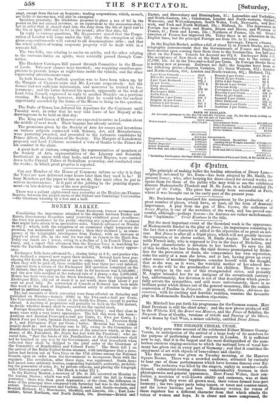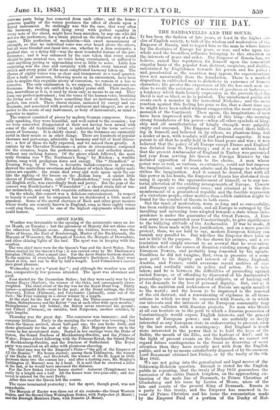THE COLOGNE CHORAL UNION.
We lately gave some account of the celebrated Kffiner Manner Gesang- Verein, in anticipation of the arrival of a large body of its members for the purpose of performing choral concerts in London. It is sufficient now to say, that it is the largest and the moat distinguished of the num- berless amateur singing-societies to which the national love of vocal har- mony has given rise in every part of Germany ; and that it combines the enjoyment of art with objects of benevolence and charity. The first concert was given on Tuesday morning, at the Hanover Square Rooms. There was a crowded audience, attracted by curiosity to hear one of those performances which have become famous over Eu- rope. The orchestra was filled by the singers, eighty in number—well- dressed, substantial-looking citizens, unmistakeably German in their physiognomies and general appearance. Herr Franz Weber, their con- ductor, a musician of well-known ability and eminence, was at their head. Though they were all grown men, their voices formed four-part harmony ; the two upper parts being tenors, or tenor and counter-tenor, and the lower baritone and bass. Harmony written for voices of these registers has a different character from that which admits the voices of women and boys. It is closer and more compressed, the extreme parts being less removed from each other; and the homo- geneous quality of the voices produces the effect of chords upon a keyed instrument. So strikingly was this the case, that very often the harmony, swelling and dying away with perfect equality in every note of the chord, might have been mistaken, by any one who did not see the performers, for a strain played on the diapason stop of a fine organ. This perfection of mechanism—this exact measurement of strength, so that no individual voice was ever heard above the others, but all were blended and fused into one, whether in a firm sostenuto, a gradual rise, or a dying fall—was the most wonderful feature of the per- formance; and it was enhanced by the care taken that every sound should be pure musical tone, no voice being overstrained, or suffered to emit anything jarring or approaching ever so little to noise. Little less surprising was the ease and certainty with which every interval was struck and every point of the most complicated harmony taken up. The chorus of eighty voices was as clear and transparent as a vocal quartet. How a body of amateurs, following music as an amusement, have been able to acquire this exquisite nicety of execution, we remain at a loss to conceive. The only explanation is, we suppose, that these amateurs are Germans. But they are entitled to a higher praise still. Their mechan- ism, marvellous as it is, is used by them only as means to an end. They form one perfect instrument ; but the tones of the human voice, breathing the living soul of feeling, have something that no instrument, however perfect, can reach. These choral strains, animated by energy and en- thusiasm, and associated with poetical sentiment and imagery, are as su- perior to the music of any instrument, or body of instruments, as mind is superior to matter.
The concert consisted of pieces by modern German composers. Gene- rally speaking, they were beautiful, and well suited to the occasion ; but we were somewhat disappointed at their not having been mixed with some of the old traditional (what is understood by the term national) music of Germany. It is chiefly choral; for the Germans are eminently social in their music as in other things. There are hundreds of popular choruses and part-songs, admirable in harmony and full of local charac- ter; a few of these we fully expected, and we missed them greatly. A cantata by the Chevalier Neukomm—a piece de cireonstanee composed for the occasion, began the performance ; sound and orthodox music, without any striking feature. Of the pieces which followed, the most truly German was " The Northman's Song," by Kficken ; a warlike chorus, sung with prodigious force and energy. The " Abendlied," or Evening Song, by F. Otto, a favourite ballad-composer at present, showed the marvellous sweetness and delicacy of which these eighty male voices are capable : the strain died away and stole again upon the ear like the sighing of the breeze on the /Eolian harp. A quaint little chorus of Ferdinand Ries, called " Trallerliedchen," very much in the old English style, was exceedingly fresh and pretty. But the gem of the concert was Mendelssohn's " Wasserfahrt" ; a choral strain full of ten- der melancholy, and sung with exquisite softness and expression.
On the whole, this concert was a delicious entertainment. In respect to beauty it could not be surpassed, but we desiderated a little more of grandeur. Some of the sacred choruses of Bach and other great masters whose works are scarcely known in England, sung as these eighty voices could sing them, would be one of the highest enjoyments which music could bestow.

























 Previous page
Previous page